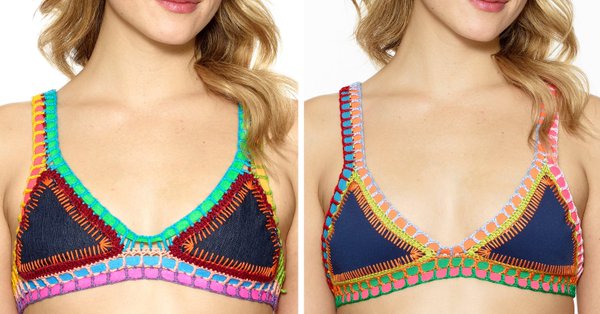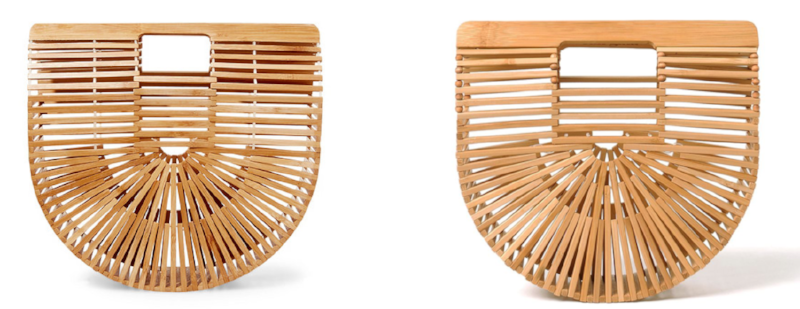“In fashion, there is a fine, sometimes indistinguishable line separating inspiration and theft.” That is what the New York Times’ Katie Rosman reported on Thursday, dissecting the rise (and legality) of designer Ipek Irgit’s “it” bikini brand Kiini. Turkish-born, New York-based Irgit launched her swimsuit line in 2013, offering up teeny-tiny crochet bikinis. “As is [also] often the case in fashion, Kiini’s success drew copycats.”
Irgit says that the singular bikini design upon which she has built her brand goes back to her childhood. Her mother and grandmother “used to make things like crochet bikinis, [when] I was like 10 and 11.” Kiini’s colorful suits would come to adorn the chiseled bodies of models, actresses, and influencers, spread all over Instagram, and help sky-rocket the brand to fame.
In an effort to cut down on some of the copies that started to flood the market en masse not long after the brand’s launch and subsequent adoption by famous faces, Irgit applied to register her bikini design with the United States Copyright Office, and set out to take some of the particularly egregious copycats to task. One such infringer was Victoria’s Secret.
With a copyright registration for “Bathing Suit Art” in hand, Irgit filed suit against Victoria’s Secret in federal court in California, accusing the lingerie giant of copyright infringement. Following an out of court settlement ahead of trial, Irgit turned her attention to Neiman Marcus and a handful of other defendants, filing a subsequent suit in April 2018 in New York federal court. That case, per Rosman, centered on claims “of unfair competition and … trade dress [infringement]. In layman’s terms, Kiini was saying that [the average] consumer … who saw a crocheted-and-exposed-elastic bikini would assume it was a Kiini [swimsuit].”
It is unclear whether the trade dress claims in the case – which similarly settled out of court several months later and was dismissed in July – would have held up to court scrutiny, as Kiini has, on more than one occasion, attempted to register its signature bikini design with the U.S. Patent and Trademark Office (“USPTO”), only to have its applications shut down.
The USPTO stated that the Kiini’s swimwear design was ineligible for trademark protection because “the applied-for mark” – which consisted of “a pattern of non-uniform rectangles forming strips that outline the edges of a bikini top and bikini bottom; the strips of rectangles have small lines extending onto the fabric of the bikini top and bikini bottom. The rectangular strips are also placed on the straps of the bikini top and bikini bottom, extending from the front to the back of both pieces of the swimsuit” – is “merely an ornamental feature of the goods.”

The design, itself, “does not function as a trademark to indicate the source of applicant’s goods and to identify and distinguish them from others,” the USPTO held early this year, prompting Kiini to ultimately withdraw its application for the bikini design.
A Legal Fight and a Cultural Question
Against the background of this mini litigation spree, though, is another story, one of cultural ownership. Despite the U.S. legal protections afforded to Kiini for the crochet design, a Brazilian woman says that she is the one who is really responsible for the bikini design. In fact, as Rosman writes, “Since 1998, [Maria Solange Ferrarini, 61] has been selling handmade crochet-and-elastic bikinis on the beach, walking up and down the sand with her creations dangling off a hula hoop.”
Her designs are part of a larger pool of Brazilian swimwear; as the Metropolitan Museum of Art noted in its “History of the Bikini” series, the beaches of Brazilian have served as a launching pad for more than one new swimwear style. For instance, “The thong, an essentially backless bikini bottom [was] first made popular on the beaches of Rio de Janeiro.”
Rosman, who visited Ferrarini in Brazil earlier this year, writes, “I looked at one of the bikinis in her living room. Ms. Ferrarini’s standard two-piece has two dark denim triangles connected by visible stitches of embroidery thread to crochet straps with brightly colored elastics woven through them. The bottom is made to match.”
“It is virtually identical,” per Rosman, “to the bikini Ms. Irgit had copyrighted.”
According to the Times, Irgit had visited the beach where Ferrarini sells her swimsuits in 2012 and returned home on a mission to recreate the crocheted swimsuits under her own name. Those lookalike swimsuits have since spawned another lawsuit. This time the lawsuit was not filed by Irgit; it named her as the defendant. The plaintiff, Maria Solange Ferrarini, filed suit in a California federal court June, citing claims of unfair business practices.
That lawsuit – which is still underway – comes as something of a similar case is pending in federal court in New York. In a case filed a few months before, Steve Madden called foul on threats of litigation lodged by Cult Gaia founder Jasmin Larian. According to Madden’s suit, it had received a cease and desist letter from counsel for Larian early this year, alerting Steven Madden to its trade dress rights in its Instagram-friendly Ark bag and demanding than Madden “[i]mmediately and permanently cease and desist from any further sale, distribution, promotion, and/or advertisement of any item that infringes upon [that] trade dress.”
The problem, according to Madden? The design of Larian’s Ark bag – and Madden’s own lookalike BBshipper bag – is derived from a “traditional Japanese bamboo picnic bag design,” and is thus, not original to either of them.
However, not only are Larian and Cult Gaia passing off the bag as its their original creation, Madden asserted in its complaint, they are in the process of attempting to claim exclusive legal rights in the design by filing an application for registration with the USPTO.

No Need for Novelty
Neither copyright law nor trademark law provide protection for functional articles in their entirety. Unlike copyright law, though, which requires that a design be original for in order to be protected, trademark/trade dress law calls for no such thing. Instead, trademark holders need just be the first to use a mark. In a trade dress context, they need to be the first to use and establish distinctiveness, aka, they need to be able to show that the average consumer associates the trade dress (the non-functional design elements of the Ark bag or the Kiini swimsuit) with a single source.
This lack-of-novelty requirement – often paired with a uneven playing field in terms of the legal/financial prowess between a brand builder and the original craftsman from which the designs are taken and the jurisdiction-specific nature of most intellectual property protections (save for intentional IP treaty coverage) – provides a potential for individuals to gain exclusive rights in design elements that they did not originally invent.
It also gives rise to an interesting point of contention when brand builders do, in fact, look to existing and/or past designs as the basis for their brands, as both Irgit and Larian have done. Legally, they may be in the clear; vintage Japanese bag makers, for instance, are not pursuing Larian for on infringement grounds for adopting and profiting from their original design, and there is a chance that Ferrari’s swimsuit was not eligible for copyright protection in Brazil.
However, such a strategy does not necessarily bode well from a PR perspective.
As Jeanne M. Heffernan, a partner in the law firm Kirkland & Ellis, told the Times in regards to Irgit’s Kiini line, for instance, “Here you have a woman who appears to have taken the [intellectual property] of someone else and registered it as her own — and then, it seems, had the audacity to sue an industry over something she did not create and may have stolen.”
“If [the allegations set forth in Ferrarini’s suit are] true, it’s breathtaking.”











